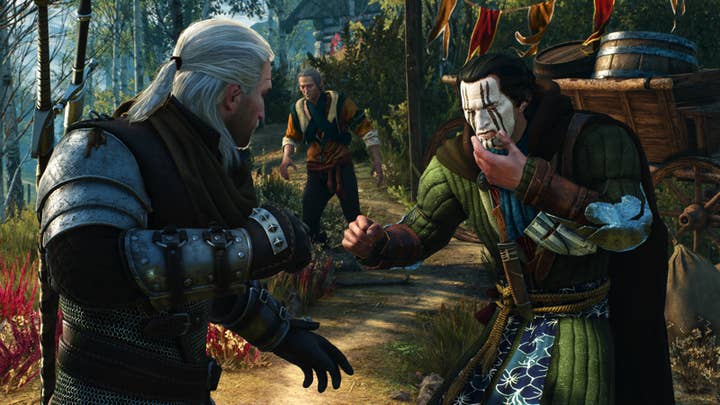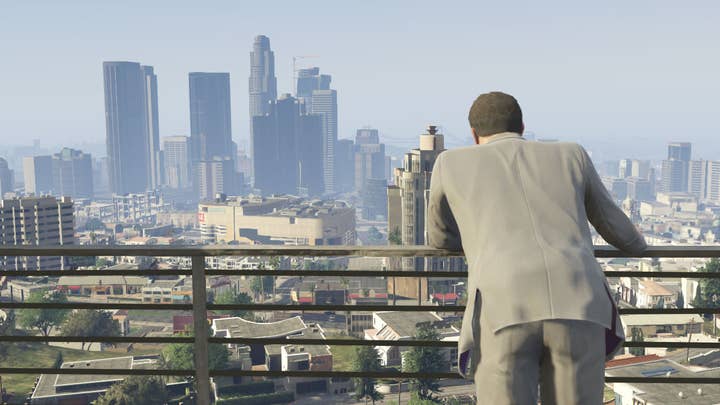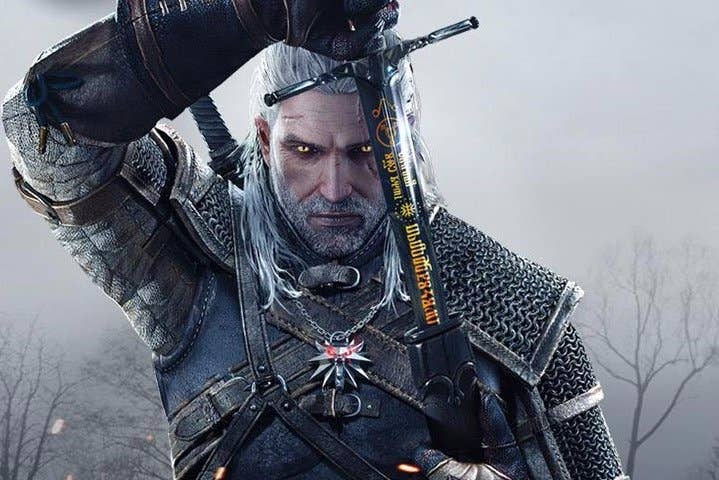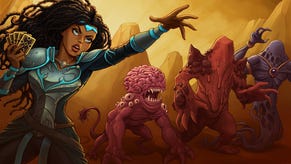CD Projekt wants to emulate "the Rockstar model"
The Witcher 3's success won't turn the company into a ten-project studio, says CEO Marcin Iwinski, but it has raised its ambitions for Cyberpunk
This isn't the first time Marcin Iwiński has collected an award in the last 12 months, but this one feels different to the rest. If the impressive figures scattered throughout CD Projekt's marketing materials are accurate, The Witcher 3: Wild Hunt has been named Game of the Year for 2015 more than 250 times. Iwiński, CD Projekt's reassuringly tranquil CEO, has not made a personal appearance for most of them, but - as you already know - this one is different.
It is GDC, little more than 12 hours since Iwiński helped to collect the most coveted prize at the Game Developers Choice Awards. The Witcher 3 is the most ambitious game the studio has attempted to date, and the response, Iwiński says, "is our dream coming true. For developers here, at the industry's main development conference, to decide that it's the game of the year? That's important shit."
"For developers here, at the industry's main conference, to decide that it's the game of the year? That's important shit"
Quite. But then The Witcher 3 could prove to be a very important game for CD Projekt. When the company laid out its commercial strategy back in 2011, just ahead of the launch of The Witcher 2: Assassins of Kings, it forecast 10 million sales for the entire franchise by the close of last year. In fact, it doubled that estimate, and made a $90 million profit in 2015 alone. "We always tried to plan realistically, if you can say that realistic planning exists in the gaming world," Iwiński says. "You can put any number there and it either works or it doesn't."
This kind of modesty is reserved only for those that build huge success from legitimately excellent work. That The Witcher 3 was a hit is no great surprise, but the scale and speed were impressive: four million units were sold to gamers in just two weeks, when its predecessors needed a combined total of eight years to reach six million.
But you don't become Poland's most revered developer simply through chance - through, "it either works or it doesn't." Iwiński attributes a great deal of the success CD Projekt has built to its focus, committing greater and greater resources to sweeping, morally turbulent RPGs populated by well-drawn characters. It is the studio playing to its strengths, he says, executed to a standard that gamers should rightly expect.

"We're paranoid about disappointing people. Even with a press release, we chew on it: What should it say? How should we say it? Is it fair? We have a test internally, which we use for the toughest cases: the 'explain it to a crowd of gamers test.' Let's say we need to make a decision on this or that piece of content in the package, and then we explain why we did that. If we convince ourselves...it's because it led to a better margin, it's probably not the right choice. It has to be about bringing value to the gamer.
"Fundamentally, it's the obsession and focus on quality... If you get 8s, you don't get the sales success or commercial success you get if you do 9s. The average Metacritic for The Witcher 3 is 93, and the user reception is over 9. It's amazing."
"We have a test internally, which we use for the toughest cases: the 'explain it to a crowd of gamers test'"
CD Projekt is now looking towards another five years, fresh from a period where it less surpassed its own expectations than obliterated them entirely. The company has a stated goal of being among the top three or four developers in the world - "Three," Iwinski cheerfully reminds me, "not four" - and while CD Projekt may already have reached that goal in the hearts and minds of certain gamers, most people would argue that Valve, Blizzard, Bethesda and a handful of others occupy a different rank.
For Iwinski, though, the company has to get there in the same way that it got here; driven by the same values, executing to the same standards and, crucially, retaining its independence. "Suddenly everybody loves us, and everybody wants to buy us," Iwinski says with a laugh, referring to the various phantom acquisitions that have haunted the pages of websites since The Witcher became a success.
"Maybe there were times when we could have used that kind of investment. But if we had done that, we would have sacrificed part of our independence, then we'd need all these stupid discussions about why this needs to be part of the game and why that shouldn't. We want to deliver our vision in terms of the creativity and the development, but also in terms of how we release the game; how we price it, what kind of value is in the additional content, how many language versions we ship around the world, how we talk directly to gamers in these markets. That's part of our value."
"We'll focus on certain things... We don't want to be a 10 project studio. The Rockstar model is nice"
With CD Projekt's games the scope is generally less important than the details, and the same appears to be true of how the company thinks about its future. It micromanaged The Witcher 3's launch to ensure it reached as many interested gamers in as direct and appealing a package as possible, even localising the game into Brazilian Portuguese and Arabic to satisfy the unexpectedly large and comprehensively underserved communities it found in those regions.
With GOG.com - and now GOG Galaxy - an increasingly important aspect of CD Projekt's overall business, it's tempting to draw comparisons to Valve at an equivalent point in 2005. Half-Life 2 had launched the previous year, to critical plaudits and commercial success, providing a huge boost to the visibility of its fledgling digital storefront, Steam. However, while the jury is out on whether Valve retains enough enthusiasm for narrative-driven, single-player games to even attempt Half-Life 3, I have no such doubts about CD Projekt. If the company gets bigger, Iwinski says, the games will remain at the centre of it all.
"The Witcher finished with 80 people, The Witcher 3 finished with 250, so Cyberpunk will probably be even more. Don't think about scale in terms of us doing 20 projects; no, we'll focus, we'll focus on certain things... We don't want to be a 10 project studio. The Rockstar model is nice."

The comparison Iwinski draws to Rockstar is enlightening. Despite being bound to a major publisher, the Grand Theft Auto developer has a near unprecedented degree of control over the way its games are made, marketed and released. It is also free of the pressures that often bedevil big studios when they become so entwined with larger corporate entities. Rockstar is one of the most valuable developers in the industry not because of the breadth and diversity of its portfolio, but through focusing on its strengths and executing without compromise.
"We have a lot of credit, so we should take the time to make Cyberpunk something really meaningful for the whole industry"
The Witcher is not Grand Theft Auto, of course, but after 2015 CD Projekt's balance sheet is, in Iwinski's words, "not too shabby." The company's next game, Cyberpunk, will show the benefit of those extra resources, "more ambitious on every single front, in the development and on the marketing side." And if Cyberpunk shows similar growth to The Witcher 3, then maybe Bethesda's seat - if not Rockstar's - at the top table really will be under pressure.
"For us, it's never about money," Iwinski says. "Yes, we deliver results, but we always explain to our investors that we have a long-term perspective. They shouldn't expect us to annualise, or suddenly start releasing games just because there's a business opportunity. Fundamentally, The Witcher 3 has proven that... and right now we have a lot of credit, so we should use that and take the time to make Cyberpunk something really meaningful for the whole industry. It has to reach the next quality bar, and I'm not talking just for us, but for the market.
"If we look at our role models, what Rockstar is doing is amazing. It's not like, 'We have to ship a game or we may not hit our financial goals.' It's, 'Here's GTA V, and by the way, it's the best game ever made.' We're all looking forward to Red Dead Redemption 2 because we know they'll show something and we'll be like, 'Oh my god.'
"But we still have to get there. We have to prove it. The Witcher 3 is a good example, but we have to keep on delivering."









